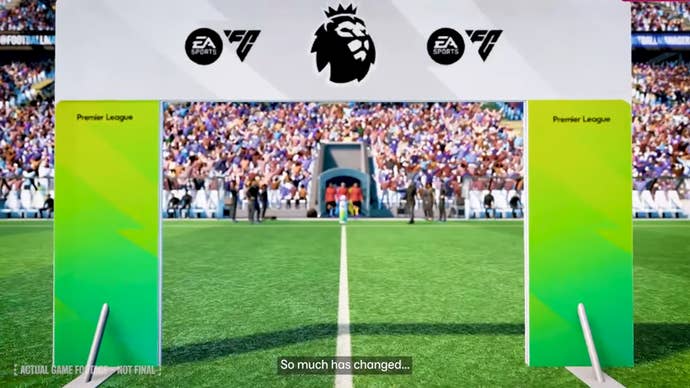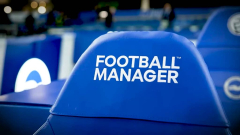It’s been a rough year for Football Manager. This time last summer, the ambitious FM25 was still a certainty, but while the development team at Sports Interactive remained optimistic – albeit to different degrees – soon came the first of two delays. FM25 would arrive two or three weeks later than its usual early November slot, the studio announced, with perhaps one of the first clues things weren’t going entirely smoothly.
It was fully unveiled later that month. Then, less than two weeks later, given a second, unprecedented delay to March 2025, a window that would’ve seen it launch three-quarters of the way through the football season. And in February this year it was cancelled altogether, the developer opting instead to divert all of its energy to this year’s Football Manager 26. It’s the first time in Sports Interactive’s 30-plus years of operating that they’ve failed to release an annual entry into the series.
“It’s my job to get the game out every year,” Miles Jacobson, Sports Interactive’s long-serving studio director tells me, during an hours-long conversation at the developer’s east London HQ earlier this summer. “We’ve done that for 30 years. But I failed to release something that was good enough.”
In a spacious corner office overlooking the still-sparkling development area of the 2012 Olympic Park in Hackney Wick, surrounded by framed football shirts, studio awards and a not-insignificant amount of desktop clutter, Jacobson sits facing outwards, looking over two big sofas towards an even bigger wall-mounted TV. Unlike many of the pristine, chaperoned office tours I’ve been on over the years, this one is very much the picture of a place in active use for work. And the work on FM26, which will, if all finally goes to plan, be released some time later this year, is still very much in progress.
Jacobson, after the roughest of development years, tells me he’s “feeling much, much better about things” this time around. “We’re making huge progress every day. We’re at a stage now where we are nearly feature complete.” And, crucially: “It feels like Football Manager.” For some time, with the old version of FM25 that would morph into this year’s FM26, that wasn’t the case.
Ultimately, FM25 was delayed and then cancelled for a simple reason. “It just wasn’t fun,” as Jacobson puts it. And it went through multiple delays before that cancellation for the same reason so many other games do the same as well. The goal was to make FM25 a genuine “leap” forward from the series entries before it. It was based on a new engine, in Unity. It had an all-new UI based on tiles, cards, and a central ‘portal’ that replaced the time-honoured Inbox. There was a huge visual revamp. And ultimately, doing all of that during a regular, annualised release schedule simply proved too much. “We put ourselves under a huge amount of pressure with FM25,” Jacobson says. “We were trying to do the impossible – trying to make the impossible possible – and there were times when we thought we could do it.”

A lot of FM25’s issues were picked up on, to some degree, as far back as late last summer. “I had an inkling even before we announced,” Jacobson says, referring to the official announcement of the game on 30th September last year, “but you can’t pull an announcement when it’s ready to go because you’ve got lots of things lined up – you’ve got spend lined up, you’ve got interviews lined up, you’ve got all this stuff.”
“On paper, everything looked great. The core game was there…”
And so, “we went out, we knew a few hours later – the decision was made literally one or two days afterwards that we were going to have to move the game.” 10 days later – after a delay to go through the due process of “stock market stuff”, with Sports Interactive owned by Sega, which is publicly traded on the Japanese stock market – the studio announced the big delay to the following March, and put out the roadmap for when certain aspects of the game would be revealed. Even then, the timeline was ambitious. “The shit was flying from all directions,” as Jacobson puts it. “It became really clear really quickly that we weren’t going to be able to hit the roadmap,” simply because footage of the game just wasn’t coming out well – “because the game wasn’t in a good enough state.”
The big realisation, that FM25 was simply never going to be ready in time, came over Christmas. The whole studio took a two-week break over the holidays, during which Jacobson traditionally boots up that year’s in-development version of the game to play around with it, and come back in the new year with a fresh perspective. “I knew within an hour that we weren’t going to be able to deliver.”
“On paper, everything looked great,” Jacobson says. “The core game was there.” The user experience, however, was the big problem. “You couldn’t find things in-game. It was clunky. Some of the screens were double-loading. The actual game itself was working – graphically, we weren’t where we wanted to be. We didn’t have the big leap that we wanted; it was a very good jump, but it wasn’t a leap,” he goes on. Part of the big, generational “leap” Jacobson is referring to here is down to the shift from the old, proprietary engine Sports Interactive has been using with Football Manager for decades to a new version of Unity, but again that just proved even more challenging than expected.
That said, the issues weren’t really technical. “It wasn’t crashing a lot, it just wasn’t fun. It felt clunky.” The game almost lost its famous – or infamous, if you ask the partners of one of FM’s many ludicrously dedicated players – “one more game” factor. It was “still there, but it was really painful… I’m gonna play the next match, but I’ve got to do all this stuff first, I’ve got to go through this and it’s going to be slow, and it’s going to be painful.” And then compounding all that were the issues with navigating through the new UI itself. “People were going: I can’t find the youth squad.”
Jacobson describes an awkward wait until the new year, opting to give the team a proper break rather than breaking the company’s rule on out-of-hours communication. On the first day back in the new year, when Jacobson was still meant to be off for the holidays, he came straight in and spoke to Matt Caroll, Sports Interactive’s COO, about the realisation the game wouldn’t make it for its twice-delayed release window of March 2025. Then, “within an hour,” he was talking to Jurgen Post, the recently-returned, long-running executive who’s now COO of Sega’s West Studios, telling him simply, “I can’t put this out.”
“We’ve got a fucking great game! We didn’t have a great game in December.”
Sega, Jacobson says, was surprisingly understanding. “To be fair, Jurgen was brilliant with it – he wanted to know the reasons why. There was no screaming, or anything like that.” The studio and Sega then had to “go away and work out how it was going to affect the financials,” before presenting it fully to Sega Japan, “who were also– they weren’t happy, but they were understanding,” Jacobson says. The teams together looked into a few different options. “What if we released in June? What if we released in May, does that give you enough time?” One of those was “knocked on the head by Sega,” Jacobson says, because “commercially it wouldn’t have worked.” Another didn’t give the studio enough time to fixed what needed fixing. And so they took the third option. “Bite the bullet and cancel, and go big or go home for this year” with FM26.
That process again was complicated. “There are a lot of things that have to happen,” as Jacobson puts it, when you cancel an annualised game like Football Manager, that has all kinds of licenses and agreements –





